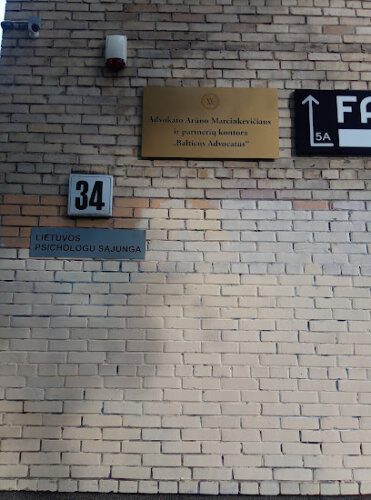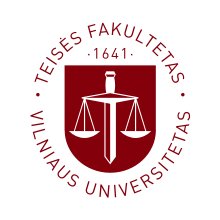Best Faith-Based Law Lawyers in Vilnius
Share your needs with us, get contacted by law firms.
Free. Takes 2 min.
List of the best lawyers in Vilnius, Republic of Lithuania


About Faith-Based Law in Vilnius, Republic of Lithuania
Faith-Based Law in Vilnius, Republic of Lithuania, refers to the legal considerations and regulations that pertain to issues unique to religious communities and individuals. Although the country's legal framework is predominantly secular, certain areas of law intersect with religious practices, including family law, religious freedom, employment laws, and discrimination laws. Faith-Based Law can involve the compliance of religious institutions with national laws, as well as the protection of individuals' rights to religious expression and observance.
Why You May Need a Lawyer
There are several scenarios where individuals or religious organizations may require legal assistance concerning Faith-Based Law in Vilnius:
- Religious Freedom Disputes: Situations where individuals believe their right to practice their religion is being infringed upon.
- Discrimination Claims: Cases where someone feels they have been discriminated against based on their religious beliefs.
- Religious Organizations' Compliance: Ensuring that religious entities are in compliance with local laws, including zoning, taxation, and regulations around religious gatherings.
- Employment Issues: Situations involving religious accommodations in the workplace or conflicts between employment duties and religious practices.
- Family Law Matters: Issues involving marriage, divorce, and child custody where religious laws or customs might be considered.
Local Laws Overview
The legal landscape in Vilnius regarding Faith-Based Law is defined by the balance between secular laws and protecting religious freedoms. Key areas include:
- Constitutional Protections: Lithuania's Constitution guarantees freedom of thought, faith, and religion.
- Civil Rights Laws: These laws prohibit discrimination based on religion and ensure equal treatment under the law.
- Religious Organizations Act: This act regulates the registration and functioning of religious communities, ensuring they meet legal standards.
- Education Laws: Public schools are generally secular but must respect religious expressions and accommodations.
- Tax Regulations: Special provisions may apply to religious institutions, affecting their taxation status and financial reporting.
Frequently Asked Questions
What rights do religious individuals have in Lithuania?
Individuals have the right to practice their religion freely, subject to public safety, health, and morals. Religious practices are protected under the Constitution and civil rights laws.
How are religious organizations recognized legally?
Religious organizations must register with the state to be recognized officially, which allows them to hold property and receive certain tax exemptions.
Can religious customs affect legal family matters?
While religious customs may influence personal beliefs, legal family matters such as marriage or divorce are governed by civil law.
Is religious discrimination illegal in Vilnius?
Yes, discrimination based on religion in employment, education, and public services is prohibited under Lithuanian law.
Are religious symbols allowed in public institutions?
Generally, public institutions maintain a secular environment. However, individuals may be permitted to wear religious symbols unless it conflicts with specific institutional policies.
What is the process to establish a new religious community?
To establish a new religious community, the group must apply for registration with the Registry of Legal Entities and meet criteria set by the Religious Organizations Act.
Can my workplace deny religious accommodation?
Employers are obligated to provide reasonable accommodations for religious practices unless it causes undue hardship to the business operations.
How are religious holidays treated under labor laws?
Employees may request leave for religious holidays, which employers are encouraged to accommodate, pending operational requirements.
Are there laws about educational content involving religion?
Public education is secular, but can include curriculum about religions objectively, preventing indoctrination or bias.
How does the law address hate speech related to religion?
Hate speech, including that targeting religious groups, is prohibited, and such cases can be prosecuted under criminal law.
Additional Resources
If you require further information or assistance, consider reaching out to the following resources:
- Vilnius Legal Aid Center: Offers guidance on legal rights and representation.
- Department of Religious Affairs: Provides resources and guidance on the registration and operation of religious communities.
- Equal Opportunities Ombudsperson's Office: Addresses issues of discrimination and can provide support in cases of religious discrimination.
- NGOs Focused on Religious Freedom: Organizations such as the Lithuanian Center for Human Rights may offer support and advocacy services.
Next Steps
If you believe you need legal assistance regarding Faith-Based Law in Vilnius, consider taking the following steps:
- Identify Your Needs: Clearly outline your legal issue related to Faith-Based Law.
- Research and Choose a Lawyer: Select a lawyer who specializes in Faith-Based Law and has experience in similar cases.
- Gather Documentation: Collect relevant information, documents, and evidence that supports your case.
- Schedule a Consultation: Meet with your chosen lawyer to discuss your situation and explore potential legal strategies.
- Evaluate Your Options: Work with your lawyer to decide on the best course of action, whether it's pursuing legal action or seeking a resolution through mediation.
Lawzana helps you find the best lawyers and law firms in Vilnius through a curated and pre-screened list of qualified legal professionals. Our platform offers rankings and detailed profiles of attorneys and law firms, allowing you to compare based on practice areas, including Faith-Based Law, experience, and client feedback.
Each profile includes a description of the firm's areas of practice, client reviews, team members and partners, year of establishment, spoken languages, office locations, contact information, social media presence, and any published articles or resources. Most firms on our platform speak English and are experienced in both local and international legal matters.
Get a quote from top-rated law firms in Vilnius, Republic of Lithuania — quickly, securely, and without unnecessary hassle.
Disclaimer:
The information provided on this page is for general informational purposes only and does not constitute legal advice. While we strive to ensure the accuracy and relevance of the content, legal information may change over time, and interpretations of the law can vary. You should always consult with a qualified legal professional for advice specific to your situation.
We disclaim all liability for actions taken or not taken based on the content of this page. If you believe any information is incorrect or outdated, please contact us, and we will review and update it where appropriate.













